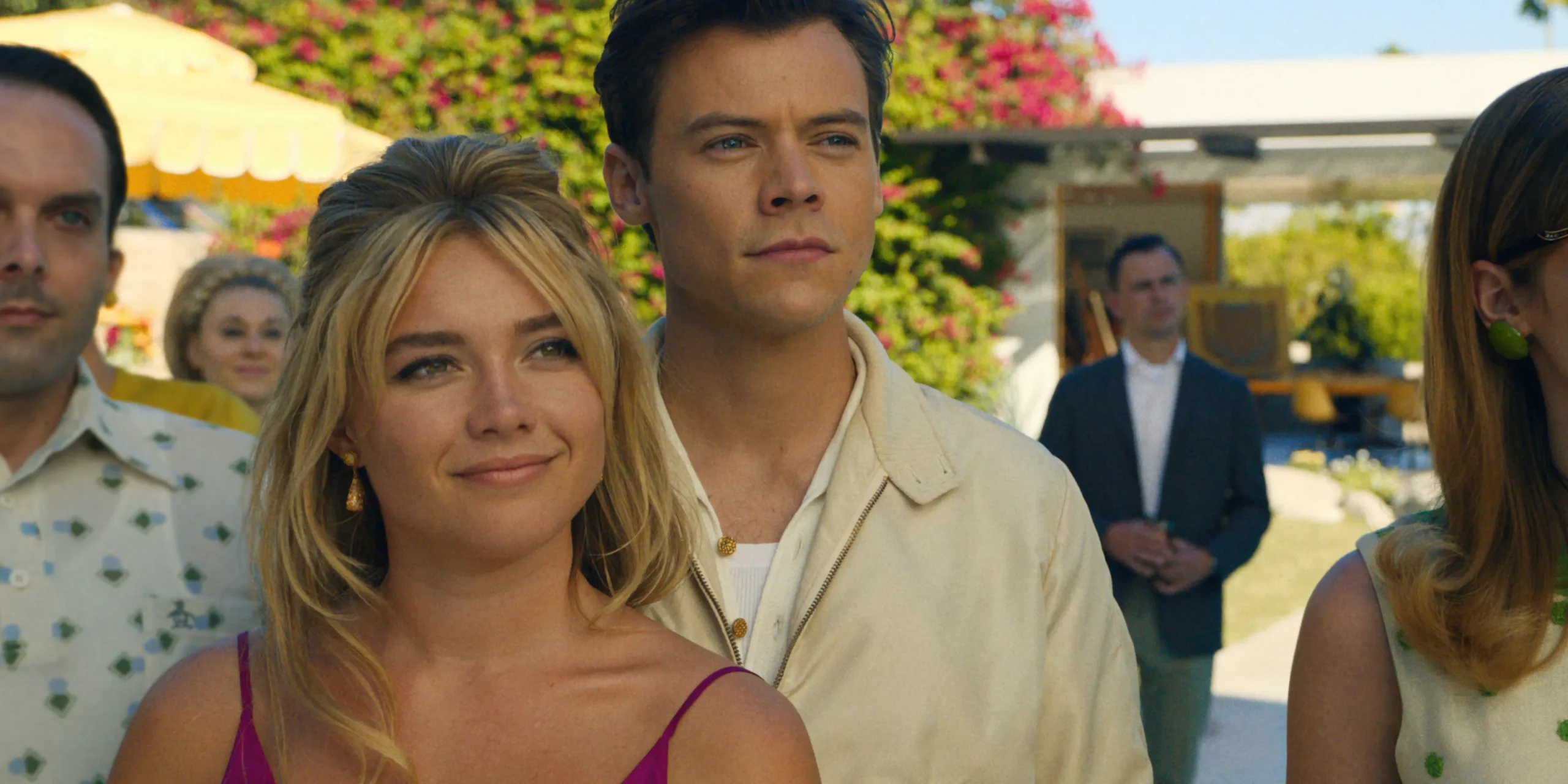“Don’t Worry Darling” situates its characters in an insular 1950s suburban community with a paradisiacal veneer called The Victory Project. The Victory Project purports an ambiguous purpose to usher in a new age of progress through covert means. Quotidian life in this microcosm consists of white-collar husbands going to work to conduct top-secret experiments while their wives are relegated to household affairs. The film foregrounds the domesticated life of Alice (Florence Pugh) and her husband Jack Chambers (Harry Styles). Alice channels all her energy into socializing with her fellow wives, taking ballet lessons, and hosting decadent house parties while Jack strives to earn the approval of his boss Frank (Chris Pine), the charismatic inventor of The Victory Project.
The only rule of The Victory Project the wives must heed is to stay within the confines of the town and never venture out to headquarters. One of Alice’s friends, Margaret (Kiki Layne), violates this rule which results in her being ostracized and labeled as mentally unstable. Margaret divulges that The Victory Project is concealing their true sinister purposes about their idyllic lifestyle, but the patriarchy ensures that no one believes her. Alice undergoes a similar journey after she witnesses a series of irregularities that compel her to break the rule and shatter her entire worldview. Alice resolves to uncover the truth and combat the forces of toxic masculinity that stand in her way.
“Don’t Worry Darling” is the second directorial effort of Olivia Wilde following her critically acclaimed debut “Booksmart.” Wilde re-teams with screenwriter Katie Silberman to craft an insipid feminist psychological thriller that believes itself to be more sublime than it actually is. Silberman’s script is devoid of the caustic witticisms present in “Booksmart” which makes it a worthy addition to the high school comedy genre. “Don’t Worry Darling” juggles themes of gaslighting, female subservience, and passivity but the film does not substantively comment on any of them. The script relies too heavily on the intrigue of the central mystery of the film which is not enthralling enough to sustain the audience’s attention for the entire film. The script sacrifices strong characterization and proper pacing for a plot twist that happens long after most viewers stop caring.
On a technical level, the film impresses with stellar costume design and psychedelic production design. The lavish costumes authentically capture the elite fashion of the 1950s. The staging of the furniture in the house conveys the psychological warfare that Alice wages. There is an optical illusion where the glass wall of the house almost suffocates Alice to illustrate how the world is attempting to silence her. Also, the hypnotic choreography of the ballet lessons calls attention to the theme of gaslighting. However, the musical score felt particularly manipulative because it is used to introduce elements of distress into scenes that do not evoke that emotion when Alice wanders aimlessly in search of answers.
Florence Pugh elevates the film with a fierce and intrepid performance because Alice is the only dynamic character in the film. Pugh displays a lot of vulnerability in her intimate scenes with Harry Styles. She has an excellent scene at a dinner table as she fends off Chris Pine’s attempts to undermine her. Chris Pine tries his best to be a commanding presence and a threat, but his rousing speeches are riddled with platitudes that do not have much of an impact. Harry Styles is serviceable as Jack and his performance seems to be intentionally melodramatic. He lashes out at Alice when he is unable to placate her to demonstrate his insecurities as a man.
“Don’t Worry Darling” desires to be a profound and provocative inclusion to the ongoing feminist film discourse, but apart from a few inventive visual elements, the treatment of its themes is extremely heavy-handed. The narrative is supported by bland characters that are unambiguously evil or incompetent. The film avoids any meaningful conversation by engaging with toxic masculinity in an oversimplified manner.












[…] Don’t Worry Darling Film Review: A Tame Examination of Toxic Masculinity […]